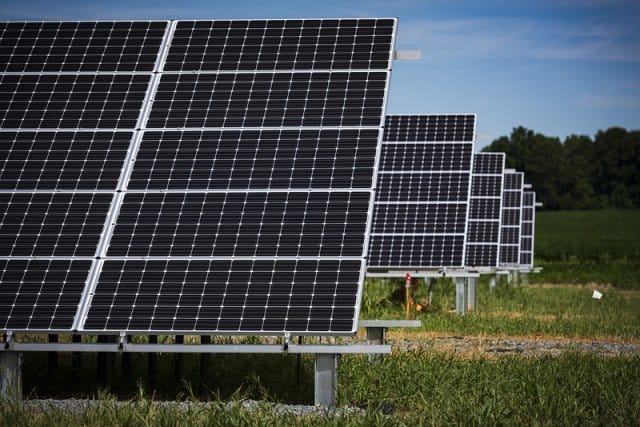The U.S. Environmental Protection Agency (EPA) announced on April 22, in celebration of Earth Day and as part of President Biden’s Investing in America agenda, that 60 recipients have been selected under the Solar for All grant competition. This initiative aims to deliver residential solar projects to over 900,000 households nationwide, particularly targeting low-income and disadvantaged communities.
Funded through the Inflation Reduction Act, which created EPA’s $27 billion Greenhouse Gas Reduction Fund, the $7 billion Solar for All grant competition represents a significant investment in clean energy infrastructure and environmental justice. The grants will empower states, territories, tribal governments, municipalities, and nonprofits across the country to develop sustainable solar programs, with a focus on enabling underserved communities to benefit from distributed residential solar.
One notable awardee among the 60 recipients is SFA Indiana (SFAI), which stands to receive $117,470,000. SFAI is a coalition comprising municipal governments and community entities in Fort Wayne, Gary, Indianapolis, and Columbus, as well as six statewide organizations. The coalition aims to solarize low-income homes and catalyze market transformation in Indiana by introducing new financial products and incentives that promote solar adoption among low-income residents and within new affordable housing developments.
EPA Administrator Michael S. Regan emphasized the significance of the Solar for All initiative, stating, “Today we’re delivering on President Biden’s promise that no community is left behind by investing $7 billion in solar energy projects for over 900,000 households in low-income and disadvantaged communities.” Regan highlighted the multiple benefits of the program, including job creation, energy cost savings, cleaner air, and climate change mitigation.
John Podesta, Senior Advisor to the President for International Climate Policy, underscored the importance of solar energy in reducing household energy costs, particularly for low-income communities. He noted, “Solar is the cheapest form of electricity—and one of the best ways to lower energy costs for American families.”
Adrianne Todman, Acting Secretary of the U.S. Department of Housing and Urban Development (HUD), stressed the health and economic benefits of residential solar, stating, “Residential solar electricity leads to reduced monthly utility bills, reduced levels of air pollution in neighborhoods, and ultimately healthier communities.” Todman emphasized HUD’s commitment to supporting initiatives that promote energy efficiency and climate resilience in low-income and disadvantaged communities.
Jennifer M. Granholm, U.S. Secretary of Energy, reiterated the administration’s commitment to expanding solar access nationwide. Granholm stated, “Sunlight is powering millions of homes across the nation, and we’re working hard to ensure Americans everywhere can benefit from this affordable clean energy resource.”
Senator Bernie Sanders of Vermont, a strong advocate for renewable energy, hailed the Solar for All program as a win-win solution for the environment and the economy. Sanders emphasized the potential of the initiative to combat climate change, lower electric bills for consumers, and create thousands of good-paying jobs.
The EPA estimates that the Solar for All program will enable over 900,000 households in low-income and disadvantaged communities to deploy and benefit from distributed solar energy. This $7 billion investment is projected to generate over $350 million in annual savings on electric bills for overburdened households and reduce 30 million metric tons of carbon dioxide equivalent emissions over five years.
In addition to reducing greenhouse gas emissions and energy costs, the Solar for All program aligns with the Biden-Harris Administration’s commitment to creating high-quality jobs and advancing environmental justice. The initiative is expected to generate an estimated 200,000 jobs across the country and provide equitable pathways into family-sustaining jobs for communities that have historically been underserved.
Furthermore, Solar for All advances President Biden’s Justice40 Initiative, which aims to ensure that 40% of the overall benefits of federal climate and clean energy investments flow to disadvantaged communities. All funds awarded through the Solar for All program will be invested in low-income and disadvantaged communities, helping to address longstanding disparities in access to clean energy resources.
Solar for All will expand existing low-income solar programs and launch new ones, serving households in all 50 states, territories, and tribal communities. Selected applicants are committed to delivering on the three objectives of the Greenhouse Gas Reduction Fund: reducing climate and air pollution, delivering benefits to low-income and disadvantaged communities, and mobilizing financing to spur additional deployment of affordable solar energy.
In conclusion, the Solar for All program represents a significant step towards achieving the administration’s goals of environmental justice, sustainable energy, and economic prosperity for all Americans. By investing in solar infrastructure and expanding access to clean energy resources, the EPA and its partners are working to build a more resilient, equitable, and sustainable future for the nation.






